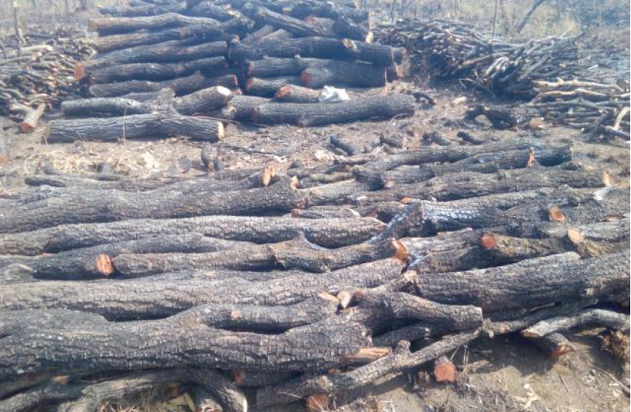Shea nut tree logs set to be burned into charcoal.
For 20 years, 41-year-old Evalyn Lanyero and more than 50 other women have been selling hot-pressed shea butter to travelers and locals in Lacekocot town council in Pader district, to cater for their family’s financial needs.
Hot-pressed shea butter has since time immemorial been used by locals in Acholi as a food seasoning and body moisturizer. But for the past three years, this source of livelihood has been threatened by bulk shea butter processors, who produce hot-pressed cosmetic shea butter products for sale on the local and international markets.
Lanyero says the bulk processors threaten their business because, unlike the locals who only make one product at a low level, the bulk processors make many products such as body jelly, lip balm, hair pomade among others, which has led to a scramble for the valuable nuts.
In the past, Lanyero could collect her own nuts and buy a minimum of 10 sacks of shea nuts from neighbours, who did not feel the urge to process the nuts into butter.
She could then process these nuts for months. But now, she has lost those clients to the large processors, who offer more money to the shea nut collectors than her.
Lanyero explains that before the emergence of bulk processors and commercial charcoal burners, she could raise 3 million Shillings each shea nut season, and use the money for paying school fees, buying animals for rearing and still save some.
Santina Adokorac, a 61-year-old woman says that she has been relying on the shea butter business to pay her children’s school fees because her husband has a disability and cannot help much. Before the outbreak of the coronavirus pandemic, her eldest son was already pursuing a diploma in civil engineering, and her daughter sat Senior Four exams, while another son is set to join senior one, all because of the shea butter business. However, this year, she collected only one and a half basins.
“This year my shea nut harvest was very low. I collected only one and a half basins. Before the bulk buyers and charcoal burners came in, I could collect two sacks of shea nuts and buy a minimum of 18 sacks from other locals, at shillings 40,000 each basin. But now, if I’m lucky to get from another person, they will sell it at shillings 80,000 a basin.”
There are a number of exporters of shea butter products in Uganda such as Shea House, Blessed Organic, Livara, Agago District Shea Nut Collectors and Processors, Gulu Nana, Joy Shea, Moo Yao, Crop Vet, Shea Care and Pelere Group among others. All these companies get their shea nuts from Acholi, Lango and West Nile sub-regions where the shea nut trees are endemic.
In 2019, these companies collectively exported about USD 760,000 (2.7 billion) Shillings worth of shea butter to countries such as Rwanda, the Middle East, Kenya, France, Germany and Japan. During the same year, the Uganda Export Promotions Board, which is in charge of Uganda’s exports set a high target of exporting 200,000 to 500,000 tons of shea butter by 2022, from the current 30,000 to 150,000 tonnes a year.
And because the shea nut trees are able to grow in great thickness of trunks and wide branches, charcoal burners and loggers also find it attractive. For this reason, commercial charcoal burners and timber dealers have over the years descended on the valuable, yet endangered tree species.
In 2006, the Ugandan government declared that the shea tree was endangered, and in 2018, the Ministry of Water and Environment, in line with the National Forestry and Tree Planting Act 2003, banned the cutting and transportation of the trees altogether following its rapid destruction. Despite these protections, shea trees are still cut down on a large scale.
Statistics from Global Forest Watch indicate that in 2010, Pader district had 380,534 acres of tree cover and it lost 126,021 acres of tree cover in 2020.
Adokorac says as their business keeps getting threatened, she and more than 50 other women who used to sell the hot-pressed shea butter in Lacekocot town council are now left wondering what next line of business to take.
-URN





